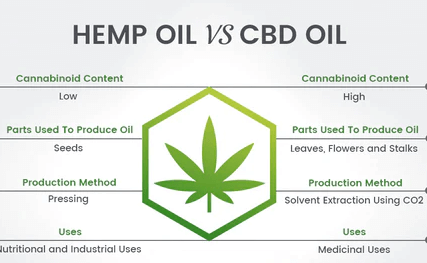Hemp Oil Vs. CBD Oil – Understanding the Differences and Benefits

Hemp oil and CBD oil are both derived from the hemp plant. However, they are not the same and offer various health benefits.
Hemp seed oil is an excellent source of omega-3 fatty acids. It’s also rich in terpenes and phytocannabinoids that have been shown to help with anxiety and mood regulation.
Cannabidiol
CBD is one of the many chemicals found in the Cannabis sativa plant. It is a nonintoxicating and potentially useful phytocannabinoid substance that is gaining popularity in medical treatment.
In 2018, the FDA approved Epidiolex, a purified form of CBD, for the treatment of rare forms of epilepsy that are difficult to control with other medications. It has many potential therapeutic applications for various disorders, including anxiety and depression.
Hemp seeds contain many cannabinoids, some more active than others. For example, hemp seed oil contains low THC but high CBD levels.
Several studies have shown that CBD can help reduce inflammation in the body. This is particularly important in cases of chronic illness, such as cancer and arthritis.
It can also aid in treating other conditions, including acne and sleeplessness. CBD has been linked to reduced levels of sebum, the lipid product that can contribute to excess inflammation in the skin.
Cannabidiol has a long history of use as an anti-inflammatory agent. It has been reported to decrease the production of inflammatory substances in the body, such as prostaglandins and leukotrienes. In addition, it is known to be anti-stress and a natural appetite stimulant. Moreover, it can be used to treat pain and nausea.
Hemp Seed Oil
Hemp seed oil is a natural, versatile oil that can be used in many ways. It’s a potent anti-inflammatory, helping to reduce pain and promote healing.
It’s also a great source of Omega 3 and 6 essential fatty acids. These fatty acids promote healthy skin, help prevent heart disease and maintain healthy blood pressure levels.
Moreover, hemp seed oil is a good source of gamma-linoleic acid (GLA), which can help reduce inflammation and may effectively fight arthritis and other inflammatory conditions.
Additionally, it’s a good source of antioxidants, vitamins A, B6, C, E and K and magnesium. It also contains a balanced amount of omega-6 and omega-3 fatty acids in a 3:1 ratio, making it an excellent choice for promoting cardiovascular health.
Hemp seed oil can also boost energy and improve brain function. In addition, it’s a natural appetite suppressant that helps keep your weight in check as you eat fewer calories.
The essential fatty acids in hemp seed oil can improve skin texture and help prevent acne. In addition, it’s rich in linolenic and linoleic acid, which can help improve skin elasticity and make your hair stronger and healthier.
Hemp seed oil is one of the best oils to use in your diet, but it’s essential to find a high-quality product that’s organic, non-GMO and free from artificial ingredients. Be sure to read the label and look for a full-spectrum product, which means it has all of the cannabinoids, terpenes and flavonoids that come with hemp.
CBD Oil
Hemp seed oil is a popular natural oil that contains the plant’s essential fatty acids, including omega-3 and omega-6. It also has anti-inflammatory omega-9 fatty acid and gamma-linolenic acid (GLA).
Hemp oil is a popular choice among people who want to add extra nutrients to their diets. It’s a good source of fiber, protein, and vitamins E and B. It’s also high in polyunsaturated fatty acids, which help reduce inflammation and promote heart health.
While hemp oil is a healthy addition to any diet, other hemp oil benefits can be particularly beneficial for those who aren’t getting enough fats from foods like fish and eggs. It also contains antioxidants that can help support the immune system and improve insulin sensitivity.
It’s also considered an excellent choice for skin care because it contains a mix of fatty acids known to boost circulation and aid the immune system. It’s rich in b-sitosterols, which have been shown to improve cholesterol levels.
When shopping for CBD products, looking for quality ingredients and third-party lab testing is essential. These tests can confirm the product’s safety and potency.
Hemp seed oil and CBD Oil are legal in the UK if they contain less than 0.3% THC. THC is the psychoactive compound in cannabis that causes users to feel high.
THC
Several different cannabinoids can be found in cannabis plants. The most common are cannabidiol (CBD) and tetrahydrocannabinol (THC). THC is responsible for the intoxicating effects of marijuana, while CBD is a nonintoxicating compound that can have a wide range of health benefits.
Both cannabinoids interact with your body’s endocannabinoid system, a group of proteins in the brain and the central nervous system that control the body’s functions. This system contains many aspects of your health, including appetite, mood, memory, sleep, and immune function.
While both cannabinoids have some fantastic health benefits, it’s essential to understand how they work and which ones are the best for you. Understanding these cannabinoids can help you decide which hemp oil type to use for your needs and goals.
One of the most significant differences between CBD and THC is their effect on your body’s endocannabinoid receptors. THC can reduce pain and inflammation, while CBD can help manage stress and anxiety and improve sleep.
However, both cannabinoids have their benefits and side effects. If you’re using CBD for medical purposes, speaking with your provider about how the drug may affect your medication is a good idea.
Some common medications that can have an impact on your use of CBD include benzodiazepine sedatives like Klonopin (clonazepam) or Ativan (lorazepam), opioid painkillers like morphine, and immuno-suppressants like Sandimmune (cyclosporine). While these drugs have limited interaction with CBD, you should discuss any changes with your doctor to avoid any unpleasant side effects.
